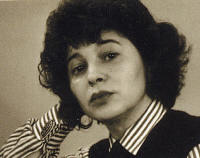Mascha Kaléko
Galicia -Berlin-New York-Jerusalem
Iris Weiss
"I have a new name. My name is no longer Aufen" Edith
Lewin remembers her former schoolmate Mascha Kaléko telling her. Her whole
life she tried to hide her illegitimate birth, her real birthday and her
Eastern European Jewish background. Born 7th of June 1907 50km west of
Krakau in a small "gossip infested town in Galicia, with a church, two or
three doctors and a big insane asylum", she experienced already as a child
flight from progroms.
 At
the onset of World War I, the family moved to Germany, where the father was
interned as an enemy alien. The mother struggled to bring up her two
children. After the war, the family moved into Berlin’s "Scheunenviertel"
(barn quarter), then highly frequented by poor Jewish immigrants from
Eastern Europe. The father tried to maintain his family working as a trader.
Mascha visited the Jewish school for girls. Later she started a vocational
training at the "Arbeiterfürsorgeamt", an institution of Jewish social work
giving special attention (councelling services) to new Jewish immigrants
from Eastern Europe. In her free time she educated herself in psychology and
philosophy and started to write poetry. At
the onset of World War I, the family moved to Germany, where the father was
interned as an enemy alien. The mother struggled to bring up her two
children. After the war, the family moved into Berlin’s "Scheunenviertel"
(barn quarter), then highly frequented by poor Jewish immigrants from
Eastern Europe. The father tried to maintain his family working as a trader.
Mascha visited the Jewish school for girls. Later she started a vocational
training at the "Arbeiterfürsorgeamt", an institution of Jewish social work
giving special attention (councelling services) to new Jewish immigrants
from Eastern Europe. In her free time she educated herself in psychology and
philosophy and started to write poetry.
1928 she married the Hebrew teacher Saul Aaron Kaléko.
From 1929 on, she published biting poetry presenting the daily life of the
common people in the newspapers "Vossische Zeitung" and "Berliner
Tageblatt". In her poetry she catches the atmosphere of Berlin in the
1920’s. Quickly she attained fame and frequented places like the famous
"Romanisches Café", where the literary world met, among them Erich Kästner
and Kurt Tucholsky. 1933 she published her first book with poetry "Lyrisches
Stenogrammheft", and two years later her second "Das kleine Lesebuch für
Grosse" with the editorial Rowohlt.
1938 she married director and music theorist Chemjo
Vinaver, the love of her life, after having divorced from her first husband.
A bail deposited by the Warburg family enabled the Vinavers and their young
son to leave Germany and to emigrate to the United States. Mascha earned
their living writing texts for advertisement. In addition she tried to
support her not so practical husband into building a new career for himself.
But their hopes of a possible career in the field of film music were crushed
and the family returned to New York after a short intermission in Hollywood.
The difficult life of a migrant deployed Maschas meagre health. The
experience of uprooting changed the tonality of her poetry. Accusations,
bitterness, yearning for the lost home and also religious motives can be
found in her writings of that period.
1956 she returned for the first time to Berlin. Four years
later she was supposed to receive the Fontane prize, which she declined
since it should have been handed over by a former Nazi official. Since her
husband, researching on Hassidic singing, had better working conditions in
Israel, the couple migrated that same year to Jerusalem. Mascha lacked
knowledge of Hebrew and was thus completely isolated. While famous in
Germany and well known in America, nobody had ever heard of her work in
Israel. Two years later her son died suddenly in New York and in 1973 her
husband followed suit. After a long time of silence, she started to write
again. But it was to be her last year of life, which came to an end while
travelling through Europe 1975. She is buried in the Jewish cemetery in
Zurich (Switzerland). |